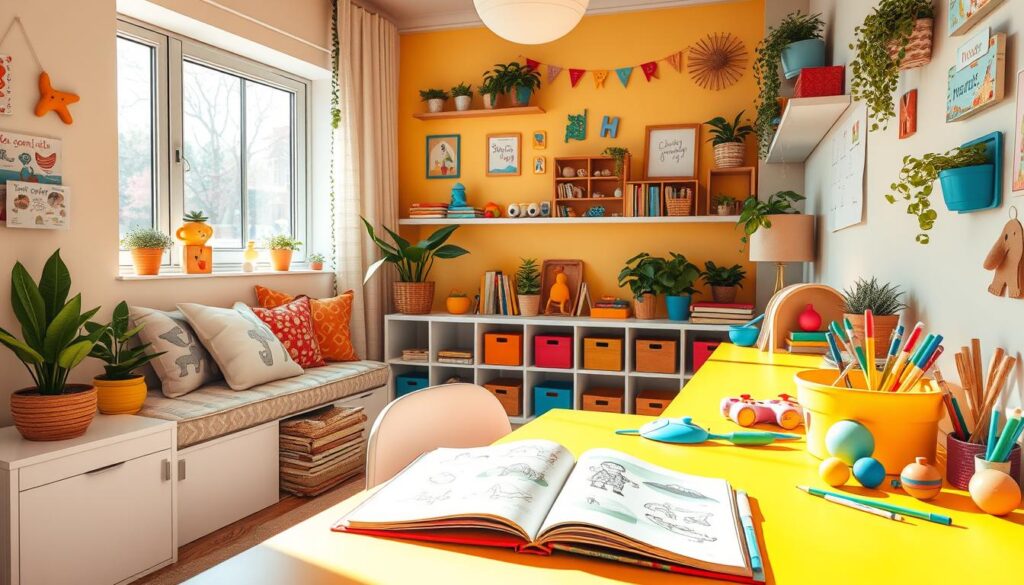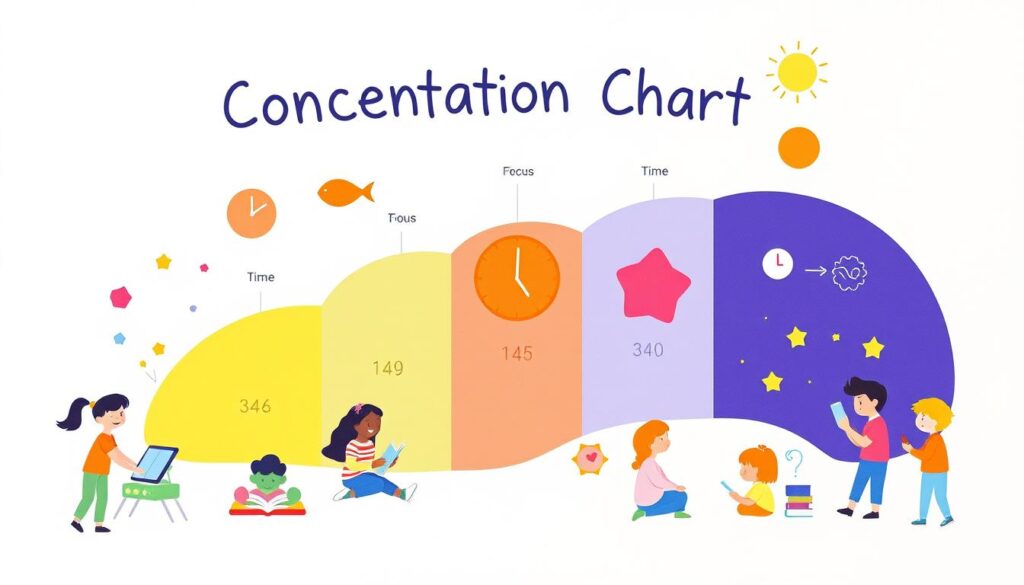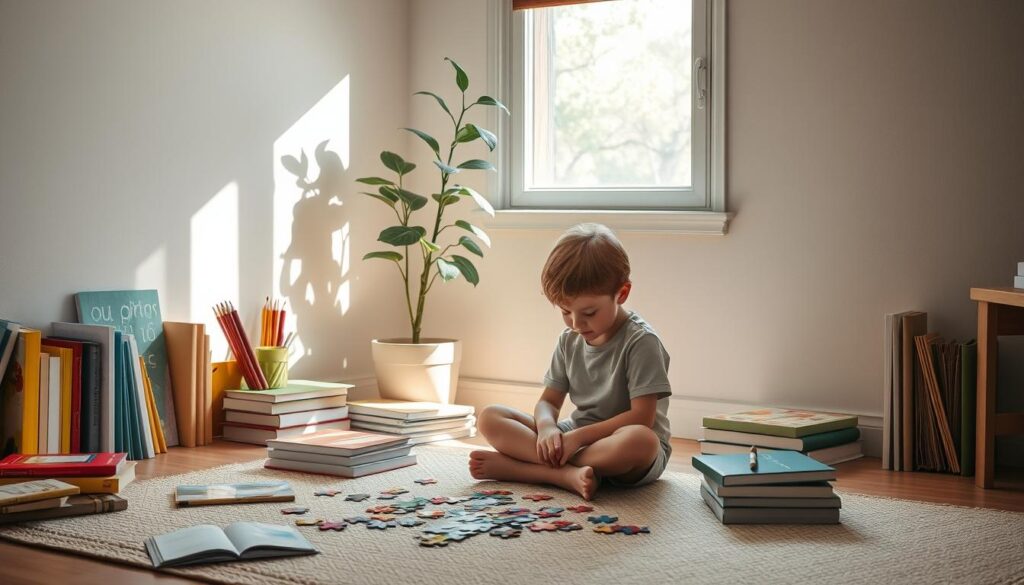Staying focused is key for success in school and life. Kids need to practice a lot to get better at focusing. We can help them by organizing things, cutting out distractions, and taking breaks.
It’s also good to get them moving with physical activities. This helps a lot.
Less TV and a quiet study area make learning easier. Starting early to teach focus helps kids do well in school. They learn more easily too.
Welcome to therubywadhwa
How to Increase Focus of a Child !
Key Takeaways
- Developing a child’s focus is crucial for academic and overall success.
- Strategies to improve focus include reducing distractions, taking breaks, and engaging in physical activities.
- Creating a distraction-free study environment can significantly enhance a child’s ability to concentrate.
- Starting early in developing concentration skills is important, as it leads to better academic performance and information retention.
- Consistent daily routines and schedules can improve a child’s cognitive abilities and emotional stability.
Understanding the Importance of Focus in Child Development

Focus is key for kids to do well in school and grow. When kids focus, they learn better and do tasks well. But, if they can’t focus, it makes learning hard.
The Role of Concentration in Academic Success
Good focus helps kids learn and remember things in class. Kids who focus more learn reading and math faster. Skills like controlling impulses and changing plans are important for school and learning.
How Focus Impacts Learning and Growth
Focus helps kids think and solve problems better. It also helps them follow directions and connect ideas. This boosts their motor skills and helps them manage feelings and actions.
Signs of Poor Concentration in Children
- Easy distractibility by noise, clutter, or other environmental factors
- Difficulty completing tasks or following through on instructions
- Inability to stay focused on a single activity for an age-appropriate duration
- Frequent shifts in attention, often due to hunger, lack of rest, or emotional states
- Excessive multitasking with devices, peer influence, or family interruptions
Knowing how focus is important helps parents and teachers help kids. They can teach kids to focus better, which helps them do well in school and grow.

| Age | Average Attention Span |
|---|---|
| 0 to 2 months | Several seconds while looking at a toy |
| 3 to 6 months | 1 minute or less |
| 7 to 12 months | Up to 1 minute, maybe more with your support |
| 12 to 18 months | Up to 2 minutes |
| 19 to 24 months | Up to 3 minutes |
| 25 to 36 months | Up to 6 minutes |
| 37 to 48 months | Up to 8 minutes |
| 4 to 5 years | Up to 15 minutes |
Knowing how long kids should focus helps us support their learning. It helps us teach them to boost their cognitive abilities and improve their focus.
Creating an Optimal Environment for Learning
Making a good learning space is key for kids to focus better. We need to cut down on noise, TV, and mess. This helps them pay attention and get involved.
Having a set study time in a quiet, comfy spot helps a lot. Studies show better grades when the learning space is good. Using teaching methods that fit the culture can boost scores by over 44%.
Being kind and having clear rules in class is important. Parents being involved helps a lot. But, too much stress for teachers can make them tired and worried. Taking care of teachers helps everyone in the classroom feel better.
| Strategies for Creating an Optimal Learning Environment | Benefits |
|---|---|
| Reduce distractions (TV, noise, clutter)Organize the study area with necessary materialsEstablish a consistent study routine in a quiet, comfortable spaceImplement positive reinforcement and clear classroom rulesEncourage high levels of parent involvementSupport teacher self-care and well-being | Improved academic performanceIncreased focus and concentrationEnhanced student engagement and motivationReduced stress and burnout for teachersStronger teacher-student relationshipsPromotion of a positive, inclusive learning environment |
By making a great learning space, we help kids focus and do well in school. These steps help kids and make the school a better place for everyone.
How to Increase Focus of a Child Through Daily Routines

Setting up daily routines is important for young minds. It helps them manage their time better. This leads to better focus all day.
Establishing Consistent Study Times
Setting a special study time each day is very helpful. It teaches kids to focus on their tasks. It shows them how important it is to stay on track with school work.
Creating Structure in Daily Activities
Organizing daily activities helps a lot. It breaks the day into smaller parts. This makes it easier for kids to stay focused and avoid getting sidetracked.
Implementing Reward Systems
Using rewards is a great way to encourage focus. It makes kids want to do well and stay on task. Rewards can be stickers, points, or small treats for good behavior.
With daily routines, structured environments, and rewards, kids can improve their focus. These skills are important for school and life.
Physical Activities That Enhance Concentration
Physical activities are great for kids to focus better. Exercise makes muscles stronger and brains work better. It helps kids with ADHD or anxiety to pay attention.
Studies say kids can focus for a few minutes each year of their age. A 5-year-old can focus for 15 minutes. A 10-year-old can focus for almost an hour.
Experts say kids need breaks every 25-30 minutes. They suggest games like “100 by 7s” to help kids focus. These games make kids better at paying attention.
Playing games like “Kim’s Game” also helps kids focus. It makes them remember things better. Giving rewards can make kids want to focus more.
| Activity | Benefits |
|---|---|
| Outdoor Play | Exposure to nature can improve attention and mental well-being. |
| Indoor Plants | Studies show that indoor plants can enhance attention and academic performance. |
| Brain-Boosting Foods | Nutrients like omega-3 fatty acids and antioxidants in foods like blueberries can aid brain function and focus. |
Parents and teachers can help kids focus by adding fun activities. This helps kids do well in school and grow up strong.
Nutrition and Its Impact on Focus
Good food is key for kids’ brains to work well. Foods high in sugar and unhealthy fats can hurt their focus. But, eating foods full of nutrients can help them focus and learn better.
Brain-Boosting Foods for Better Concentration
Some foods help kids focus more. These include:
- Milk and eggs, which are rich in protein and other essential nutrients for brain development
- Fatty fish like salmon and tuna, containing omega-3 fatty acids that are crucial for cognitive function
- Oats and whole grains, providing complex carbohydrates to fuel the brain
- Berries, citrus fruits, and dark chocolate, which contain antioxidants and flavonoids that improve memory and attention
- Nuts, which are a good source of healthy fats, protein, and minerals like zinc and magnesium
Hydration and Mental Performance
Drinking enough water is also key for kids’ focus. Not drinking enough water can hurt their memory and focus. So, it’s good to remind kids to drink water all day to help them focus and learn.
Meal Timing for Optimal Focus
When kids eat can also affect their focus. It’s best to avoid sugary and high-fat snacks. And, no caffeine for them. Eating healthy foods at regular times helps their brains stay sharp all day.
“Proper nutrition is essential for supporting brain development and enhancing focus in children. By incorporating brain-boosting foods and maintaining healthy hydration habits, we can help kids thrive academically and in their overall learning and growth.”
Screen Time Management and Digital Distractions
It’s important to control screen time for kids. TV, texts, and social media can distract them. We should not let them use phones or read texts when studying.
Setting rules for device use during learning helps kids focus better.
Studies show kids and teens spend 7-9 hours daily on digital media. In the U.S., teens use screens for about seven hours a day, not counting schoolwork. Too much screen time can harm their health, a European Commission report says.
Digital addiction is a big worry in places like China and South Korea. Parents and teachers must manage screen time and reduce distractions. Working together is key to helping kids concentrate better.
Research shows a link between tech use and distraction. But screens don’t cause ADHD. The brain gets better at focusing with practice.
To keep kids focused, we can teach them to do one thing at a time. Activities like playing and reading also help improve attention and thinking skills.
“The correlation between screen time and attention is based on self-reported data, making it challenging to determine the exact relationship between the two factors.”
By managing screen time well and reducing digital distractions, we can help kids stay engaged and improve their focus. This can lead to better school grades and brain growth.
Educational Games and Activities for Improving Focus
Playing educational games and doing activities can help kids focus better. There are many fun ways to improve their attention. This includes STEM toys and games that help solve problems.
STEM Toys and Learning Tools
STEM toys are fun and help kids focus. They include building blocks, puzzles, and coding kits. These toys make kids think and pay attention for a long time.
MentalUP has helped over 10 million people focus better. The Education Alliance Finland says their activities are very helpful.
Concentration-Building Games
Games like Uno and jigsaw puzzles help kids concentrate. They also improve thinking skills. MentalUP’s “Follow Me” and “Shape Matching” games are great for focus too.
Creative Activities for Mental Development
Creative games and activities make learning fun. They help kids focus and solve problems. Chrysalis Educare says good concentration leads to success in school.
Using different games and activities helps kids focus and do well in school. Parents and teachers can make learning fun and helpful.
Breaking Down Tasks for Better Concentration
Helping kids focus is key for their school success and growth. Breaking big tasks into smaller ones helps a lot. It makes tasks easier and lets kids feel they’re getting things done.
Big tasks can feel too much for kids. But, when we split them up, kids can handle one part at a time. They feel proud of what they’ve done, which boosts their motivation and focus.
- Encourage kids to work in 20-30 minute chunks, with breaks in between. This keeps their attention and stops them from getting tired.
- Help them make checklists or to-do lists. It helps them stay on track and focused.
- Teach them how to handle big assignments by breaking them down into smaller steps.
Using these strategies helps kids improve their focus and organization. A step-by-step approach makes a big difference. It helps kids stay focused and interested.
Conclusion
Improving a child’s focus is a big job. It needs a mix of things like a good learning space and regular routines. It also includes being active, eating right, and watching less TV.
Using fun games and activities can also help. Breaking tasks into smaller parts helps a lot. This way, kids can learn to focus better.
Parents and teachers in India can make a big difference. They can help kids focus and pay attention better. This helps kids do well in school and grow up strong.
By focusing on our kids’ focus, we’re helping our country’s future. We’re making sure they have the skills to succeed in today’s world.
Let’s keep finding ways to help kids focus better. Remember, early experiences shape a child’s future. By focusing on how to increase focus of a child, improving child concentration, and enhancing child attention span, we can help them reach their dreams.
FAQ
What is the importance of focus in child development?
Focus is key for kids to do well in school and life. They need to practice to get better at staying focused. This helps them learn and remember things better.
What are some strategies to improve a child’s concentration?
To help kids focus, keep things tidy and cut out distractions. Give them breaks and get them moving. Also, make sure they have a set routine every day.
Having a special place for studying and less TV helps too.
How does physical activity affect a child’s concentration?
Being active is great for kids’ focus. It makes their muscles strong and helps them pay attention better. Sports and other activities boost blood flow to the brain.
This makes kids more alert and focused.
What role does nutrition play in a child’s ability to focus?
Good food is important for kids’ brains. Eating foods like milk, eggs, and fish helps them focus. Drinking enough water is also key.
It keeps their brain working well.
How can educational games and activities help improve a child’s focus?
Games and activities can really help kids focus. Things like STEM toys and puzzles improve their thinking skills. This makes them better at paying attention.
How can breaking down tasks help a child stay focused?
Breaking big tasks into smaller ones helps a lot. It makes things feel less overwhelming. Kids feel like they’re making progress.
This helps them stay organized and motivated. They learn to plan their day better.